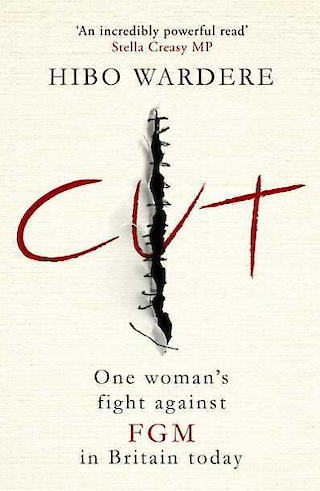Content warning - this blog post discusses female genital mutilation (FGM).

I first started following Hibo Wardere a couple of years ago. I was scrolling through twitter when I was drawn to a picture of a beautiful women in traditional African dress. Reading on, her story told of a 6 yr. old child subjected to the cruelest form of abuse imaginable, Female Genital Mutilation (FGM). This experience has led Hibo Wardere to a life of activism and campaigning against the practice of FGM.
Born in Somali sh e came to London as a teenage refugee in 1989 fleeing the Somali Civil War. Her testimonials and campaign work has made her one of Britain’s most prominent campaigners against FGM and she has appeared in numerous publications including on the BBC.
e came to London as a teenage refugee in 1989 fleeing the Somali Civil War. Her testimonials and campaign work has made her one of Britain’s most prominent campaigners against FGM and she has appeared in numerous publications including on the BBC.
Hibo has also written and published a book called Cut: One woman’s fight against FGM in Britain today.
An opening paragraph from her book “Imagine for a moment that you are 6-years-old and you are woken in the early hours, bathed and then dressed in rags before being led down to an ominous looking tent at the end of your garden. And there, you are subjected to the cruellest cut, ordered by your own mother”.
The World Health Organisation estimates that globally 100-140 million girls & women have undergone some form of FGM and currently about 3 million girls under 15 years undergo FGM every year.
There is no medical or religious reason for the practise of FGM, indeed many religious leaders denounce the practice.
So why is it practised?
"In every society in which it is practiced, female genital mutilation is a manifestation of deeply entrenched gender inequality. Where it is widely practiced, FGM is supported by both men and women, usually without question, and anyone that does not follow the norm may face condemnation, harassment and ostracism. It may be difficult for families to abandon the practice without support from the wider community. In fact, it is often practiced even when it is known to inflict harm upon girls because the perceived social benefits of the practice are deemed higher than its disadvantages.” UNFPA – (United Nations Sexual and Reproductive Agency), July 2020.
UNFPA publications also tell us that FGM is carried out as a way to control women’s sexuality. It is thought to ensure virginity before marriage and fidelity afterward, and to increase male sexual pleasure. It is also seen (amongst other things) as part of a girls initiation into womanhood and as an intrinsic part of a community’s cultural heritage.
At what age is FGM preformed?
UNFPA tell us the age FGM is performed varies depending on the area, FGM can be carried out during infancy – as early as a couple of days after birth. In others, it takes place during childhood, at the time of marriage, during a woman's first pregnancy or after the birth of her first child. Recent reports suggest that the age has been dropping in some areas, with most FGM carried out on girls between the ages of 0 and 15 years.
The practice of FGM can be found in communities around the world, from Africa, the Middle East, Eastern Europe, South America and in many western countries as well as various European countries including the U.K. where FGM is practiced among diaspora populations from areas where the practice is common.
Somalia has the highest rate of FGM in the world with 98 % of women have undergone the practise (Source - Martine Pochon, Reginal Protection Advisor for the Greater Horn of Africa) followed by Guinea, Djibouti, Mali and Sierra Leone. 22 of the 28 countries in Africa where FGM is endemic have legislation criminalising FGM, although enforcement is generally weak and prosecutions rare.
FGM is illegal in the U.K
The Prohibition of Female Genital Mutilation (Scotland) Act 2005 (asp 8) is an act of the Scottish Parliament. It extended previous legislation by also making it illegal for UK nationals to perform female genital mutilation outside the borders of the UK. There have been no known cases of girls from Scotland being sent abroad for the procedure. The Act also increased the maximum penalty from five to 14 years.
It replaced the Prohibition of Female Circumcision Act 1985. The corresponding legislation for the rest of the United Kingdom is the Female Genital Mutilation Act 2003.
FGM: a violation of human rights
FGM is recognised internationally as a violation of the human rights of girls and women.
It reflects deep-rooted inequality between the sexes, and constitutes an extreme form of discrimination against women.
It is nearly always carried out on minors and is a violation of the rights of children.
The practice also violates a person's rights to:
- health, security and physical integrity;
- be free from torture and cruel, inhuman or degrading treatment;
- life (when the procedure results in death).
FGM has no health benefits. It harms girls and women because it interferes with the natural functions of their bodies. Reference : Scottish Government website.
According to the statistics released by NHS Digital, there were 6,590 women and girls who either had a procedure to treat their FGM or were identified as having undergone FGM previously when they were treated between April 2019 and March 2020. Of those, the FGM happened in England in 145 cases.
The first successful prosecution in the UK for FGM occurred in February 2019. The defendant in this case was convicted of carrying out FGM on her daughter when she was three years old, with the crime being discovered after the defendant called an ambulance for her daughter due to extensive bleeding caused by the procedure. In his sentencing her to 11 yrs. The judge remarked that he could not be certain whether the defendant had cut her daughter or a “witch doctor” mentioned by her daughter had been the one to inflict the injuries while the defendant had held her child down.
Hibo Wardere can be found on Facebook, twitter & Instagram @HiboWardere and on YouTube: Hibo’s story
There are many other campaigners on the eradication of FGM, we can help with educating people about FGM, signing petitions and reposting articles to keep it in the public eye, every little bit helps to end the cruel cut.





